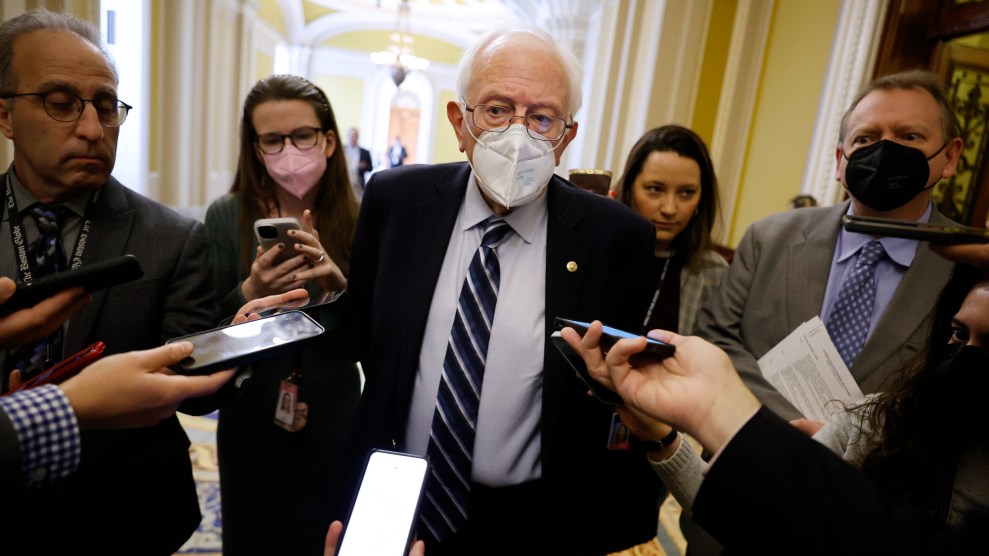
Sen. Bernie Sanders (I-VT) talks to reporters in December before meeting with U.S. Transportation Secretary Pete Buttigieg and Labor Secretary Marty Walsh about a potential railroad strike. Chip Somodevilla/Getty
Last fall, many union railroad workers in the United States did not have paid sick days. Now, more than sixty percent of them do, Reuters reports. It has been a process of slow, piecemeal wins over many months—and a testament to the continued push of high-profile politicians like Sen. Bernie Sanders (I-Vermont).
Last December, railroad workers threatened to strike, an action that would have brought the US economy to a screeching halt. At the center of the debate: sick days. It was the main frustration for many rail workers, as my colleague Noah Lanard reported. Hoping to avert a pre-Christmas supply-chain catastrophe—a strike would’ve reportedly cost $2 billion a day—President Biden signed a bill forcing the unions and rail companies to make a deal. That new agreement increased wages and schedule flexibility. But it lacked sick days.
For many workers, Biden’s decision was seen as an act of betrayal by a politician who pledged to be the most pro-union President in modern history. “President Biden campaigned on a week of paid sick leave for all working people, and then he had the opportunity right here but didn’t take action,” a rail worker named Matt Weaver told In These Times in January. “He favored the corporations.”
Sanders lambasted the rail companies for denying paid sick leave in a February letter to industry leaders. “Last year, the companies you lead made over $22 billion in profits,” Sanders wrote. “Guaranteeing seven paid sick days to rail workers would cost your industry just $321 million.”
As Andrea Hsu reported for NPR in February, this was coupled with increased pressure: The workers maintained their demands, unions kept negotiating, and the White House got back on the phone with the rail companies. Little by little, the companies began to concede.
“We know that many of our members weren’t happy with our original agreement,” Railroad Department Director for the IBEW (International Brotherhood of Electrical Workers) Al Russo said in a statement. “But through it all, we had faith that our friends in the White House and Congress would keep up the pressure on our railroad employers to get us the sick day benefits we deserve.”
In his statement, Russo singled out Sanders for applying pressure on behalf of rail workers. “We truly compliment his effort to bring dignity to workers in the rail industry. Without it, we very likely would not have gotten what we have gained today,” Russo said.
As Lanard reported, the averted strike was “years in making.” It came as a result of widespread corporate consolidation and “precision scheduled railroading,” a cost-saving measure that was largely borne out on the rail workers.
“We’ve been playing the long game on this,” Russo of the IBEW added. “We never stopped applying pressure on the companies or on Congress.”













